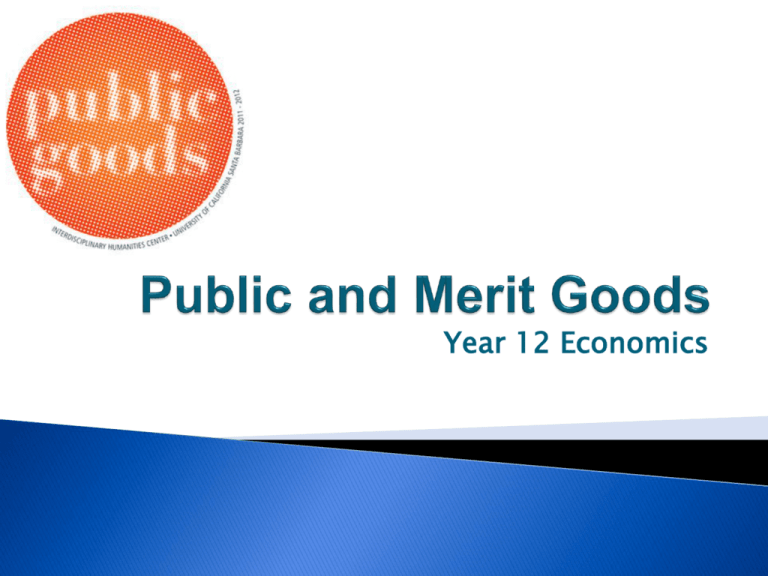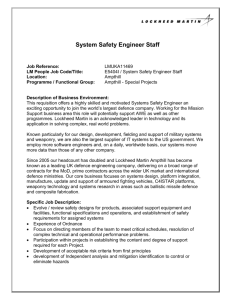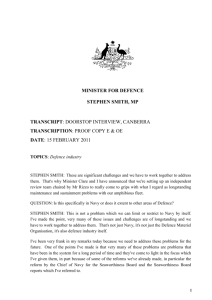File - your own free website
advertisement

Year 12 Economics Markets may lead to an efficient allocation of resources. However, there are some goods and services which economists recognise are unlikely to be produced in free markets. These may include defence, the judiciary and the criminal justice system, the police service, roads, the fire service and education. More controversially, some believe that the free market is poor at producing health care and housing for less well off. There are different reasons why there might be market failure in the production of these goods. Nearly all goods are PRIVATE GOODS (not to be confused with goods produced in the private sector of the economy). A private good is one where consumption by one person results in the good being available for consumption by another. For example, if you eat a bowl of muesli, then your friend cant eat it, if a firm builds a plant or a piece of land, that land is not available for use by local farmers. A few goods however are public goods or pure public goods. These are goods which possess two characteristics. Non-rivalry- consumption of the good by one person does not reduce the amount available for consumption by another person; sometimes this is known as non-diminishability or non-exhaustibility Non-excludability – once provided, no person can be excluded from benefiting (or indeed suffering in the case of a good like pollution). There are relatively few examples of pure public goods, although many goods contain a public good element. Clean air is a public good. If you breathe in clean air it does not diminish the ability of others to breathe clean air, moreover, others cannot prevent you from breathing clean air. Defence is another example. An increase in population of the UK does not lead to a reduction in the defence protection accorded to the existing population. Goods which can be argued to be public goods are ... Defence The Judiciary and Prison Service The Police Service Street Lighting If the provision of public goods were left to the market mechanism, there would be market failure. This is because of the free rider problem. A public good is one where it is impossible to prevent people from receiving the benefits of the good once it has been provided. So there is very little incentive for people to pay for consumption of the good. A free rider is someone who receives the benefit but allows others to pay for it. For example, citizens receive benefits from defence expenditure. But individual citizens could increase their economic welfare by not paying for it. In a free market national defence is unlikely to be provided. A firm attempting to provide defence services would have difficulty charging for the product since it could not be sold to benefit individual citizens. The result would be that no one would pay for defence and therefore the market would not provide it. The only way around this problem is for the state to provide defence and force everyone to contribute to its cost through taxation. A Merit good is one which is underprovided by the market mechanism (i.e. One which some people think should be provided in greater quantities). One reason for the under provision is that individuals lack perfect information and find it difficult to make rational decisions when costs occur today but the benefits received only come in, say, thirty years time. Another reason is because there are significant positive externalities present. Health, education and insurance are the main merit goods provided today by the government in the UK. Health and insurances are two examples where consumers find it difficult to make rational choices because of time. If left totally to market forces, the evidence suggests that individuals would not give themselves sufficient health cover, or cover against sickness, unemployment and old age. Young people tend to be healthy and in work. Many find it difficult to appreciate that one day they will be ill and out of work. A Demerit Good is one which is overprovided by the market mechanism. The clearest examples of demerit goods are drugs- everything from hard drugs such as heroin to alcohol and tobacco. Consumption of these goods produces large negative externalities. Crime increases, health costs rise, valuable human economic resources are destroyed and friends and relatives suffer distress. Moreover individuals themselves suffer and are unable to stop consuming because drugs are addictive. Therefore it can be argued that consumers of drugs are not the nest judges of their own interests. Governments intervene to correct this market failure. They have three main weapons at their disposal: they can ban consumption as with hard drugs; they can use the price system to reduce demand by placing taxes on drugs; or they can try to persuade consumers to stop using drugs, for instance through advertising campaigns http://www.youtube.com/watch?v=ftkYPpD4K8M Direct Provision- Governments can supply public and merit goods directly to consumers free of charge. In the UK primary school educations, visits to the doctor and roads are provided in this way. The government may choose to produce the good or service itself, as with primary school education, or it may buy in the services of the firms in the private sector. General Practitioners, for instance work for themselves and the governments buy their services. Subsidised Provision- The government may pay for part of the good or service (a subsidy) but expect consumers to pay for rest, Prescriptions or dental care are subsidised in this way in the UK. Regulation- The government may leave provision to the private sector but force consumers to purchase a merit good or producers to buy a merit good. For instance, motorists are forced to buy car insurance by law. There is an ongoing debate in industrialised countries whether workers should be forced to pay into private pensions. Motorway service stations are forced to provide toilet facilities free of charge to motorists whether or not they purchase anything. Government Intervention Advantages Disadvantages Direct Provision Government directly controls the supply of goods and services- it determines the number of hospital beds etc. Maybe inefficient, particularly if the government produces the good itself. Wrong mix of goods could be produced. May provide too many soldiers and too few hospital beds for instance. Subsidies Can help those on low incomes to afford to buy goods. Decisions about the level of subsidies can become captured by producers. Subsidies then become too large to maximise welfare. Regulation Requires little or no taxpayers money to provide the good. Regulations can impose heavy costs on the poor society. Consumers are also likely to be able to shop around in the free market for a product which gives them good value, ensuring productive and allocative efficiency. Regulations can also be ignored. It would be extremely improbable that a free market system would lead to a distribution of resources which every individual would see as equitable. It is therefore argued by some economists that the state has a duty to reallocate resources. In the UK, for instance, there is some consensus that British Citizens should not die for lack of food, or be refused medical treatment for lack of money. In the UK over 30% of all public spending is devoted to social security payments. Some of these payments come from the national insurance fund and therefore could be seen as merit goods. However, benefits such as family credit are an explicit attempt to redistribute income to those in need. It could also be argued that free provision of services such as health and education leads to more equitable distribution of resources.






